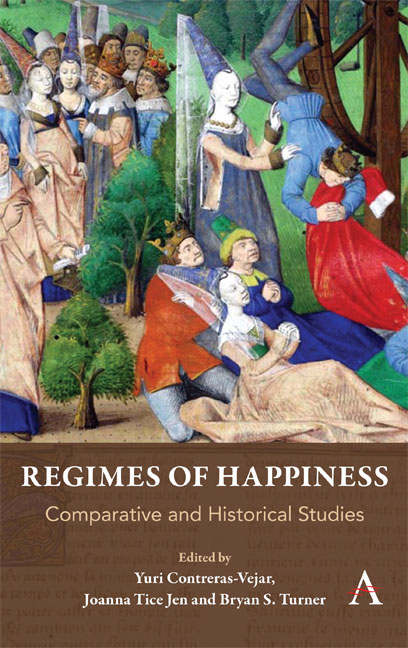Book contents
- Frontmatter
- Contents
- Acknowledgements
- Notes on Contributors
- Introduction: Reflections on Regimes of Happiness
- Part I Happiness in the West
- Chapter One A Fragment of Bliss: Augustinian Beatitudo and the Ideal of Atonement
- Chapter Two Arts of Happiness and Love: Translating Aristotle in the Later Middle Ages
- Chapter Three Spiritual Transcendence as the Path to Happiness in a Selection of Old French Texts
- Chapter Four On Machiavelli, St. Francis and the Pursuit of Happiness
- Chapter Five Their Idea of Happiness Prevents Easy Categorization of Scottish Enlightenment Philosophers
- Chapter Six A Path to Eternal Happiness: Convent Life in the United States in the Nineteenth Century
- Chapter Seven “Be Joyful Always!”: Twenty-First-Century Evangelical Conceptions of Happiness and Trumpist Politics
- Chapter Eight The Erasmus Program: The Promise of European Happiness
- Chapter Nine Innovations in the Psychological Study of Happiness: From Mirror Neurons to Mobile Technology
- Part II Comparative Perspectives
- Index
Chapter Four - On Machiavelli, St. Francis and the Pursuit of Happiness
from Part I - Happiness in the West
Published online by Cambridge University Press: 29 May 2019
- Frontmatter
- Contents
- Acknowledgements
- Notes on Contributors
- Introduction: Reflections on Regimes of Happiness
- Part I Happiness in the West
- Chapter One A Fragment of Bliss: Augustinian Beatitudo and the Ideal of Atonement
- Chapter Two Arts of Happiness and Love: Translating Aristotle in the Later Middle Ages
- Chapter Three Spiritual Transcendence as the Path to Happiness in a Selection of Old French Texts
- Chapter Four On Machiavelli, St. Francis and the Pursuit of Happiness
- Chapter Five Their Idea of Happiness Prevents Easy Categorization of Scottish Enlightenment Philosophers
- Chapter Six A Path to Eternal Happiness: Convent Life in the United States in the Nineteenth Century
- Chapter Seven “Be Joyful Always!”: Twenty-First-Century Evangelical Conceptions of Happiness and Trumpist Politics
- Chapter Eight The Erasmus Program: The Promise of European Happiness
- Chapter Nine Innovations in the Psychological Study of Happiness: From Mirror Neurons to Mobile Technology
- Part II Comparative Perspectives
- Index
Summary
Strangely enough, no one has noticed in the life of Niccolò Machiavelli a pattern of engagement with Franciscans. Machiavelli's writings mark a significant shift in the development of Western ideas concerning happiness. It helps us better to understand this shift if we realize that an important part of what Machiavelli proposed was developed in opposition to teachings that were emphasized two centuries earlier by St. Francis of Assisi and that remained influential in Machiavelli's own day.
On Beatings
We can perhaps best illustrate the manner in which Machiavelli responded to the poverello from Assisi by looking at a dramatic passage in the Little Flowers of Saint Francis, a popular collection of stories concerning Francis that was composed in the late fourteenth century and circulated widely in Machiavelli's time – as it still does today. The author of the Little Flowers writes,
One day in winter, as St Francis was going with Brother Leo from Perugia to St Mary of the Angels, and was suffering greatly from the cold, he called to Brother Leo, who was walking on before him, and said to him: ‘Brother Leo, if it were to please God that the Friars Minor should give, in all lands, a great example of holiness and edification, write down, and note carefully, that this would not be perfect joy (letizia)’.
A little further on, St Francis called to him a second time: ‘O Brother Leo, if the Friars Minor were to make the lame to walk, if they should make straight the crooked, chase away demons, give sight to the blind, hearing to the deaf, speech to the dumb, and, what is even a far greater work, if they should raise the dead after four days, write that this would not be perfect joy’.
Shortly after, he cried out again: ‘O Brother Leo, if the Friars Minor knew all languages; if they were versed in all science; if they could explain all Scripture; if they had the gift of prophecy, and could reveal, not only all future things, but likewise the secrets of all consciences and all souls, write that this would not be perfect joy’.
- Type
- Chapter
- Information
- Regimes of HappinessComparative and Historical Studies, pp. 51 - 62Publisher: Anthem PressPrint publication year: 2019

